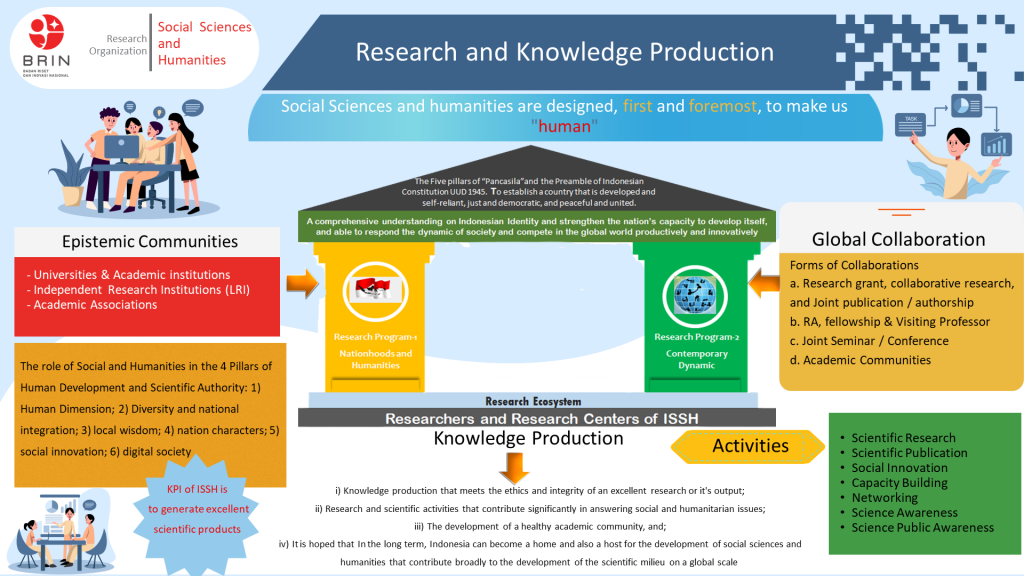
Research Organization of the Social Sciences and Humanities (ROSSH) of the National Research and Innovation Agency (BRIN) has a strong desire to gain an honorable place in the global academic arena. This effort is realized by producing various works to be published by reputable, authoritative, and credible international journals or international book publishers. Currently a number of books authored by ROSSH researchers published by Routledge, Springer, ISEAS, NUS Press, and the like, but the number needs to be increased.
Various Research Centers (RC) under the ROSSH can compete with various international research institutions such as ISEAS Yusof Ishak Institute, RSIS NTU, CSEAS Kyoto, Max Planck Institutes, and so on in producing knowledge. The formation of BRIN as the only government research institution in the country, automatically there will be no more competitors at home. Hence, the competition is not with independent research institutions in the country, but with research institutions overseas.
To achieve this target, ROSSH strives to take advantage of various schemes provided by BRIN. Among other things, by using the schemes of research fellow and visiting professors from abroad to improve the academic environment at ROSSH and improve more intensive academic interactions between ROSSH researchers and authoritative, credible, and productive academics.
In addition, ROSSH is trying to employ five other strategies, namely:
First, through Global Collaboration. Currently, IPSH collaborates with Leiden University, KITLV Netherlands, CSEAS Kyoto University Japan, ISEAS Yusof Ishak Institute Singapore, and 14 academic institutions in Asia that are members of the SEASIA consortium. Four programs are planned for 2022, i.e., SEASIA conference (9-11 June 2022), BRIN-ISEAS Conference on Millennial Disruptions (15-16 August 2022), BRIN-ISEAS Conference on New Capital Nusantara (27-28 October 2022), BRIN-LDE Academy (7-10 November 2022). Each of these activities is expected to be a forum that brings together IPSH researchers with academically strong foreign researchers. The expected results from each of these activities are in the form of edited volumes, articles published in reputable journals, proceedings, and joint proposals for activities in 2023.
Second, through the design of research process at the Program Home, which is slightly different from previous years. This process has been adjusted so that researchers are accustomed to producing articles in each year of research. The process begins with a Design Research Seminar held in March. With a solid research design, researchers can be more effective and efficient in carrying out research, not wasting time and money in field research.
Third, the next strategy is to adopt a system that has been carried out by certain campuses; namely submitting a book or edited volume proposal to a reputable international publisher such as Springer. The proposals submitted are based on the research themes carried out by the researchers themselves. This is done so that the publishing process is not only supervised by the Research Center, but by the publisher directly from the beginning of the research. There are nine edited-volume proposals submitted by ROSSH to Springer for review. This edited-volume strategy is also an effort to avoid researchers from being trapped in predatory journals.
Fourth, merit based system. A researcher will obtain appreciation and incentive in the form of monthly salary who produce good works.
Fifth, developing ROSSH’s website to be fully in English. The website is expected to be a showcase for knowledge production carried out at ROSSH and serves as a window for foreign academics to start collaborating with researchers at ROSSH.
